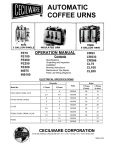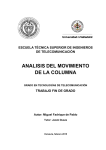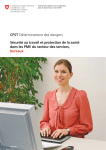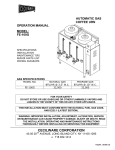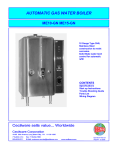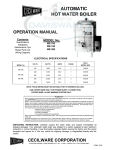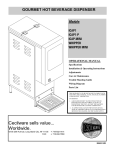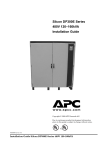Download Cecilware FE100G Specifications
Transcript
FE100G Automatic Coffee Urn OPERATION MANUAL Contents SPECIFICATIONS INSTALLATION ADJUSTMENTS OPERATING INSTRUCTIONS MAINTENANCE TIPS PARTS LIST ILLUSTRATIONS WIRING DIAGRAMS FOR YOUR SAFETY DO NOT STORE OR USE GASOLINE OR OTHER FLAMMABLE VAPORS AND LIQUIDS IN THE VICINITY OF THIS OR ANY OTHER APPLIANCE. THIS INSTALLATION MUST CONFORM WITH THE NATIONAL FUEL GAS CODE ANSI Z223.1 (Latest Edition). WARNING: IMPROPER INSTALLATION, ADJUSTMENT, ALTERATION OR MAINTENANCE CAN CAUSE PROPERTY DAMAGE. INJURY OR DEATH. READ THE INSTALLATION. OPERATION AND MAINTENANCE INSTRUCTIONS THOROUGHLY BEFORE INSTALLING OR SERVICING THIS EQUIPMENT. WARRANTY Every Ceclware product has been carefully inspected before shipment. The finest of materials and the highest standards of workmanship have been but into the equipment. Within 1 year of purchase, should any Cecilware product show defect in factory workmanship or material, we agree to Repair, at our option or replace without cost to user such parts which prove upon factory inspection to have been so defective. All equipment must be shipped transportation charges prepaid for acceptance. This warranty covers replacement parts only, labor charges are covered for 90 days after installation. This warranty does not apply under the following conditions: • neglect or abuse of equipment • excessive lime condition • Improper installation • any outside modification to equipment Every Cecilware urn body is covered for three years. This warranty covers the stainless steel body and stainless steel liners only. Portable equipment such as Electric Fryers, Food Warmers, Electric Stoves, Dispensers, Plug-In Urns, Coffee Brewers and Warmers must be returned to the factory or brought to an authorized service station for repair. CECILWARE CORPORATION 43-05 20th Avenue, Long Island City, N.Y. 11105 • 718-932-1414 N529A-4/92 FOR YOUR SAFETY DO NOT STORE OR USE GASOLINE OR OTHER FLAMMABLE VAPORS AND LIQUIDS IN THE VICINITY OF THIS OR ANY OTHER APPLIANCE. SAFETY PRECAUTIONS FOR YOUR SAFETY, THE FOLLOWING SAFETY PRECAUTIONS SHOULD BE FOLLOWED AND ENFORCED. 1. Instructions must be posted in a prominent location and all safety precautions taken in the event the user smells gas. Obtain this information from your local gas supplier. IF YOU SMELL GAS: 1. OPEN WINDOWS 2. DON'T TOUCH ELECTRICAL SWITCHES 3. EXTINGUISH ANY OPEN FLAMES 4. IMMEDIATELY CALL YOUR GAS SUPPLIER 2. Lighting - Follow instructions on label attached to side of urn, or see page 2. 3. This appliance is equipped with a three prong (grounding) plug for your protection against shock hazard and should be plugged directly into a properly grounded three-prong receptacle. Do not cut or remove the grounding prong from this plug. 4. A wiring diagram of the control is located on the inside of the removable control box panel. 5. Do not place anything over the flue opening. 6. Do not place combustibles or non-combustible materials in the vicinity of the urn as this could cause fires or obstruct air to the main burners. 7. This installation must conform with local codes, or in the absence of local codes, with the National Fuel Gas Code ANSI Z223.1 latest edition. 8. Provide adequate air supply and ventilation. 9. Provide adequate clearance for air openings into the combustion chamber. 10. Provide clearances for servicing and proper operation. 11. This appliance must be electrically grounded in accordance with local codes, or in the absence of local codes, with the National Electrical Code ANSI/NF PA No. 70 latest edition. 12. FOR USE ON NON-COMBUSTIBLE FLOORS - MINIMUM CLEARANCE FROM COMBUSTIBLE CONSTRUCTION 6" FROM SIDE - 8" FROM BACK. 13. Urn must be disconnected from gas supply during any pressure testing of pipelines in excess of 1/2 psig, and isolated (by turning off manual gas shut-off valve) during any testing equal to or less than 1/2 psig. 14. Retain this manual for future reference. 1 FE-100 Gas SPECIFICATIONS Dimensions Body Depth 16" Overall Depth to faucet centers: 19 1/2" Working Height 26" Overall Height: 31" Overall Width: 37 1/2" Water Connection: 1/4" tubing Constructed of type 304, 18-8 Stainless Steel Approx Ship Wt; 125 Ibs. Performance Gas Data Electrical Data 15 gals. per hr. 32,000 BTU. Natural & Propane 120V. 3 amps plug-in for electrical accessories Note: Use TOSSAWAY- PAPER FILTERS No. 718 INSTALLATION INSTRUCTIONS FE-100G GAS AUTOMATIC SPECIFICATIONS: Natural Gas - 32,000 BTU @ 4" W.C. Pressure Propane Gas- 32,000 BTU @ 10" W.C. Pressure Electrical Connections — Cord Type Plug-in 120 Vac, 15 Amp — 50/60 Hz Power Requirement — 3A @ 120V 50/60 Hz INSTALLATION: CAUTION: Examine the gas specifications label attached to the urn to be certain that the type of I ) JS for which the unit is equipped is the same as the gas supply. It is essential to leave a minimum clearance of 6" from the side walls and 8" from the rear wall. Machine is supplied with a water strainer (23) and a 19" length of 1/4" (outside diameter) copper tubing with a flare fitting. Connect the copper tubing with the flare fitting to the water connection at the rear of the machine. The other end of the strainer is connected with a suitable length of '/4" tubing and shut off valve (supplied by a plumber) to a cold water supply. Water pressure should be a minimum of 20 Ibs. for proper operation. Before connecting the gas line, turn on the water supply valve and insert the line cord into a 120V grounded outlet. The water will start entering the urn and the water filling operation will be going on while the gas connections are made, thus saving installation time. Connect the 3/8" gas line to the gas shut-off valve (1) located at the rear of the thermostat control. Check all gas connections with soap solution before attempting to light urn. LIGHTING AND ADJUSTMENTS - (Refer to Illustration 1) Water must be visible in the gauge glass before lighting pilot. Turn on the main gas valve and set the thermostat dial to the desired temperature. Turn the gas cock valve (9) on top of the thermostat to the "pilot" position. Insert a lighted match through the opening located on the bottom of the urn and depress the pilot button (10) while lighting the pilot. Hold down the pilot button for at least 30 seconds and release. The pilot will remain lit. NOTE: It may be necessary on the first lighting to hold the pilot button for a longer period to allow the trapped air to escape from the lines. Turn the gas cock valve (9) to the "ON" position and the burner will light. 2 RELIGHTING: Shut off all gas and wait 5 minutes before relighting pilot. SHUTTING DOWN: To shut down urn completely, turn gas cock knob to "OFF" and main gas valve off. Gas and thermostat adjustments are set at the factory, however, due to different gas conditions, it may be necessary to make minor burner adjustments. The gas orifices are fixed and the proper flame adjustment is obtained by adjusting the air shutters which are accessible from the opening in the bottom of the urn. In case of prolonged power failure, turn gas cock valve to "pilot" position. When power supply resumes, turn gas cock valve to "ON" position. For all other adjustments and maintenance procedures, refer to the urn text. PARTS LIST FOR FE-100 GAS Item No. 1 2 2a 3 4 4a 5 5a 6 7 8 FE-100 GAS URN ILLUSTRATION 1 Description Gas valve Pressure regulator (nat. gas) Pressure regulator (prop gas} Thermostat Nat. Pilot thermocouple set Prop. Pilot thermocouple set Nat. Orifice Prop, Orifice Burner Manifold Thermocouple Part No. F008A L043A L198A L024A F047A F048A F098A F126A G090Q F044A F002A Correct Procedures for Brewing Coffee As Recommended by the Coffee Brewing Center 1. Use fresh urn or drip grind coffee - - - spread evenly as an even coffee bed is important for proper extraction. 2. Urn should be connected to cold water supply and the water heated sufficiently to insure brewing temperatures of 195°-2050F.(900-96°C). Leave cover on urn during brewing. Total contact time for urn grind should be approximately 4-6 minutes. 3. Remove grounds and filter basket immediately after water has dripped through. 4. If automatic agitation is not incorporated, mix brew by drawing off heavy coffee from bottom of batch and pouring back into brew. Mix at least one gallon per pound of coffee used. 5. Never repour brewed coffee back through spent grounds. 6. Hold coffee at 185°-190°F (85°-88°C) for proper serving temperature. Brewed coffee should not be held for longer than one (1) hour; it should never be reheated if allowed to cool, and it should never be boiled. Par. 2. TIMER: An electronic solid state timer is used to control the volume of water for brewing the coffee. The timers are pro-set at the factory to deliver Vh gallons of water for each brewing cycle. However, if other volumes of water are desired, or a correction is necessary, follow these instructions: To increase the volume of water, turn the timer knob clockwise (see illustration 2). To decrease the volume of water, turn the knob counterclockwise. Run through a complete cycle for each setting. Note that the timer cannot be readjusted once it is activated. To terminate the cycle if the liner overflows, simply activate the cycle stop switch at the bottom of the side box. If the maximum setting of the timer fails to deliver enough water, check the water pump and spray head and follow instructions under maintenance. Par. 2a. SPRAY ARM BY-PASS ADJUSTMENTS: Urns equipped with an adjustable by-pass are delivered from the factory with the by-pass adjusted. If further by-pass adjustments are required to correct local water conditions, proceed as follows: Place the spray head over the center of the right coffee liner and activate the brew cycle switch. Insert a screwdriver in the by-pass adjustment slot and turn it counter-clockwise to increase or clockwise to decrease by -pass flow. At the completion of the brewing cycle, measure the volume of the water in the coffee liner. The timer may have to be re-adjusted to obtain the correct volume of water. The proper setting of the by-pass will have to be determined by the user. 3 Par. 3 THERMOSTAT: To adjust the temperature of the water in the urn (205°F) or (96°C), turn the thermostat knob to its maximum counter-clockwise position. Remove the knob by pulling it toward you. Hold STOP while nut is loosened, taking care not to move temperature adjusting screw. When the indicator of the temperature approaches the "W" in the word BREW, slowly rotate the thermostat shaft until the burner flame goes out. Turning the shaft clockwise lowers the temperature and conversely counter-clockwise raises it. Locate stop against stop pin and tighten nut-replacing knob. MAINTENANCE TIPS Par. 4. WATER CONDITION: Remove and clean spray head cap and spray head disc frequently - typically once a week. (See illustration 3.) To clean swivel valve, loosen nut and remove spray arm assembly from urn. Sediment may be removed by inserting a pipe cleaner through small hole in valve. If maximum setting of timer fails to deliver enough water, check water pump (28). Par. 4a OUTSIDE SERVICE: Should you require help contact the factory, your factory representative, or your local service company. FOR QUALIFIED SERVICE PERSONS ONLY When servicing of unit is required, contact a qualified service agency. CAUTION: DO NOT TURN ON THERMOSTAT BEFORE ALL PRIMING INSTRUCTIONS ARE COMPLETED. Par. 8. WATER FROM COLD WATER SUPPLY LINE DOES NOT ENTER URN. (Refer to illustration 2) 1. Check water supply to shut-off valve and strainer. 2. Check fuse (30) on front panel and replace with proper fuse if necessary. 3. If steps 1 and 2 are in order, remove fuse and lift outside panel from urn. 4. Remove two screws from timer panel and remove timer exposing terminal strip (III. 4) and electrical wiring. 5. Replace fuse. 6. Place wire jumper across terminals (8) and (9) on terminal board (III. 4). If water enters urn, float switch is inoperative and should be replaced as explained in Par. 10. If water does not enter urn, then solenoid valve (27) or small relay (14) is not functioning. To check solenoid valve, disconnect leads from the coil and apply 115V power. If solenoid operates, replace relay. Par. 9. REPLACING SOLENOID VALVE: 1. Shut off water supply and remove fuse (30) from front panel. 2. Disconnect wires from terminals on solenoid coil. 3. Remove flare nut from solenoid valve and unscrew solenoid valve from bracket. 4. Install new unit. Par. 10. REPLACING FLOAT SWITCH: 1. Remove fuse (30) from front panel. 2. Remove screws from timer panel and remove timer exposing terminal board and electrical wiring. 3. Disconnect wires from terminals (8) and (9) on terminal board and release float switch wires. (See III. 4). 4. Unscrew packing nut from bottom of float mechanism and remove cartridge (17)by pulling on the wires. 5. Replace with new cartridge and assemble unit and wiring in reverse order. CLEANING FLOAT CONTAINER: Periodically it may become necessary to clean out float container(13)in order to keep float switch in proper operating condition, 1. Remove float can cover (10) from top of control box exposing ball float (9) and stem. 2. Lift ball from stem. 3. Clean container and all parts and reassemble unit. 4. Replace cover. Par. 11. AUTOMATIC REFILL OVERFLOWS: Remove fuse (30) from front panel, water should cease flowing which indicates float switch is inoperative. However, if water still continues to flow, valve in solenoid is lodged or dirty and should be replaced. Follow instructions in Par. 9 or 10. Par. 12. NO WATER FROM SPRAY HEAD: 1. Check panel fuse (30) first. 2. a. Depress BREW button (29) and note if pilot light remains lit when button is released. If pilot light stays on, we can assume water pump is not operating. Remove side panel and check if fan on water pump is not rotating; then pump should be replaced as in Par. 13 4 Par. 13. REPLACING WATER PUMP: 1. Turn off water and electrical power from urn. 2. Drain urn to level of center faucet. 3. Open the control box and disconnect the two pump wires from the quick disconnect terminals. 4. Loosen union fittings on pump and remove pump from urn. 5. Replace pump and follow priming instructions. Note: Pump and motor assembly are factory lubricated for the life of the pump. Par. 14. TIMER-SOLID STATE: Depress BREW button and hold for approximately 10 seconds and then release. If w ater flows from spray head when button is depressed and stops flowing after button is released, then timer is faulty and should be replaced. No water from spray head when button is depressed, indicates BREW button is at fault and must be replaced. AGITATOR OPERATION: The agitator pump circuit is programmed to operate when the brew button is pushed. Upon completion of the pump cycle, the agitator pump will pump air through the manifold into the coffee gauge glasses and into the coffee liner. The completed cycle will take approximately 20 seconds. The agitator may be operated independently of the brewing cycle, if the agitator button is depressed. MAINTENANCE: The air pump is capable of delivering enough air for proper blending. However, if enough agitation is not present, check flexible tubing on top of gauge glasses, gauge glasses and fittings, for possible air leaks. If air pump does not operate on completion of brewing cycle or when agitation button is depressed, replace air pump or solid state agitator timer (black box). BURNER MAINTENANCE: The two main burners can be removed by first removing the base cover panel and unfastening the burner ends. The main burners should be cleaned both inside the venturi portion and on the outside using a soft bristle brush. The main burners must be replaced into the same position as prior to removal. Once a year, a qualified service agency should be contacted to inspect the appliance for safe and proper operation. PARTS LIST ITEM NO. STOCK NO. PARTS LIST DESCRIPTION 1 2 E045A U019A Complete spray assm, w/bypass Vent cap drain 3 4 5 6 7 7 8 9 10 11 12 13 14 15 16 17 18 18 19 20 Q024A E023A H050A C511A U152A L249A L238A E040A U022A V002A Q082Q U023Q L018A C008A B034A L019A L205A L210A B039A BOOOA Cover with knob 3" Nipple union assembly 9 ½” Agitator tubing Agitator pump assembly Agitator box cover Agitator assm. (solid state aut.) Solid state agitator timer Float Float can cover Brew basket (s/s) Liner - 3 gallon Float can assembly Relay Capacitor & resistor assm. Terminal block Float switch Solid state timer 120V Solid state timer 220V Grounding lug Terminal Block 22 K028A Elbow 23 24 25 25 E002A H016Q C396A C142A Water strainer 19" Copper tubing Fuse holder, SC -6 type Fuse holder, FN type (Canadian) 26 L017A Cycle stop switch ITEM NO. 5 STOCK NO. DESCRIPTION 27 27 27 27 28 28 28 28 28 29 30 30 31 32 L022A X008A X033A X035A EOOOA EOOOT U070A E069A X032A L012A C395A C141A L236A L007A Solenoid .35 GPM Solenoid coil Solenoid diaphragm repair kit Solenoid flow washer (Not shown) G-water pump Rebuilt G-water pump G-water pump fan H-water pump Seal kit for G-water pump BREW switch Fuse 6A SC -6 Fuse. 5AFN (Canadian) Agitator switch Dial thermometer 35 D021A Shank for coffee gauge 36 37 38 39 40 40 D017A X005A M005S D022A E009A E071A Water and coffee faucet Coffee gauge glass Legs, chrome Shank for water gauge Overflow drain Overflow drain 41 42 43 44 45 46 X006A D024A D001A H051A H025Q K108A Water gauge glass 8" or 8'/2 -Water gauge shield 9" Coffee gauge shield 5" Agitator Tubing Overflow tube Vent cap assembly 718 Filter pack (Not shown) Illustration 2 (FE 100 GAS Shown) SPRAY ARM ASSEMBLY This new improved spray head system was designed to facilitate easier cleaning and maintenance The swivel valve has a greater flow opening and the spray head cap is equipped with a stainless steel disc used to control the flow of water. This enables the operator to clean the spray system at the spray cap disc instead of re moving the complete swivel with assembly. It is necessary to use the correct disc and spray cap with each coffee urn. Adjustable by-pass is standard equipment on Cecilware coffee urns models FE-75, - 100, - 250, - 300, - CRS-66 and 100G 6 6 FE-100 G WIRING & SCHEMATIC DIAGRAMS








